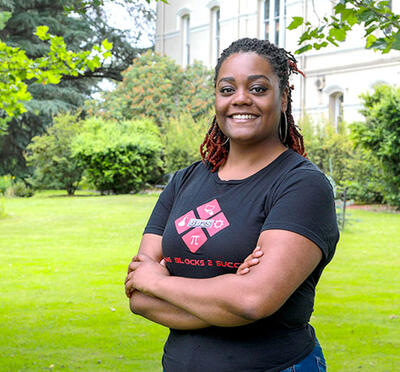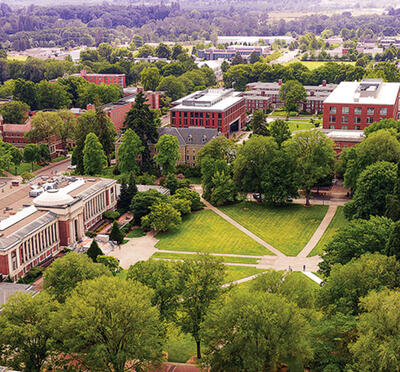Terri Fiez was elected to the 2018 Academy of Distinguished Engineers, an award from the College of Engineering at Oregon State University.
Terri Fiez applied the lessons in leadership she gained as a Ph.D. student at Oregon State University to her career as a professor, entrepreneur, and university academic leader. But her commitment to education was part of a family tradition: Her grandmother was a teacher for 36 years, her father was a professor of education, and her mother was an English teacher.
However, academia was not a path she pursued right away. After she received a bachelor’s and master’s in electrical engineering from University of Idaho, Moscow, she started her career in industry until she realized that something was missing.
“I wanted to feel like I was really making a difference in people’s lives,” she said.
Both she and her husband were able to return to school together, enrolling in graduate school at Oregon State (his degree was in crop and soil sciences).
“It worked out great. I always wanted to work in analog and integrated circuits, and one of the top guys in the country was at Oregon State,’” she said.
That “top guy” was Dave Allstot, who has returned to Oregon State as a professor after holding academic positions at University of Washington, Stanford University, and University of California at Berkeley.
“From the time I first met Terri, it was clear that she was a ball of fire. She has a great personality and is naturally comfortable in the academic environment, whether as a student, professor, or administrator. Terri is equally good at strategic and tactical thinking,” Allstot said.
The admiration is mutual.
“I was really fortunate to work with Dave for the development opportunities he provided for me,” Fiez said.
It was not just the research training that she valued, but also his encouragement to take leadership roles. In Allstot’s lab she advised several master’s students on projects related to her research. That, combined with her experiences as a lead teaching assistant, helped her to develop management skills.
“When I finished my Ph.D. I felt ready to hit the ground running,” she said. Fiez began her academic career at Washington State University, Pullman, where she enjoyed having an active research group of undergraduate and graduate students. One of her major contributions to the department was to build a program in analog-mixed signals.
"When I finished my Ph.D. I felt ready to hit the ground running." - Terri Fiez
But she felt there was more she could do and jumped at the chance to come back to Oregon State as the head of the Department of Electrical and Computer Engineering which later merged with the Department of Computer Science to become the School of Electrical Engineering and Computer Science.
“I saw a lot of unrealized potential here,” she said. “What I enjoy more than anything is creating and building something, and in this case it was a whole program.”
As head of the school her focus was twofold: innovative education and world-class research.
On the education side, her focus was to create experiential learning opportunities for the students that would enhance both their technical and leadership skills, such as the Tekbots program for which she received an IEEE award.
Another major contribution to education was spearheading the computer science online degree program for post-baccalaureate students. It was the first one in the country of its kind and has grown rapidly in the last five years to 1,482 enrolled students. Oregon State’s program has been in the top 10 in various national rankings nine times since 2014. (See the related story, “Meeting industry needs” about the growth of the online program.)
On the research side, through her leadership the school was able to triple enrollment in the Ph.D. program in just eight years. She says part of the success was identifying key research areas and recruiting top faculty in those areas to gain national recognition. One of those areas was cybersecurity, which was also a focus for the whole state of Oregon.
“We had realized that cybersecurity was going to be really important, and so for a number of years we worked on hiring the right people, and suddenly we hired four at once,” she said.
That group has taken off, becoming part of the Cyber Resilient Energy Delivery Consortium and the Oregon Cybersecurity Center of Excellence. (See the related story, “Opportunities in cybersecurity” about cybersecurity at Oregon State.)
She has applied her experiences as school head at Oregon State to her new position as vice chancellor for research and innovation at University of Colorado Boulder where she is supporting the growth of a cybersecurity program, and has started a similar online degree program in computer science. Fiez is also leading an innovation and entrepreneurship initiative, and overseeing industry collaboration and technology transfer for the University. She builds off her experiences at Oregon State cultivating commercialization and connecting company representatives with students and faculty.
“I’m taking all of those experiences at Oregon State to the next level to grow the impact of the university,” she said.
The importance of family figures prominently for Fiez even when reflecting on her career.
“When I was an undergrad, Tim and I were dating. We married right after I graduated with my bachelor’s, then we went to graduate school together. We’ve supported each other and have been partners in all that we do,” she said. “Things came full circle when both of our boys graduated from OSU. So, when I think about my personal life and career, they are intertwined — I think of the faculty, staff and students at OSU as part of my extended family.”



